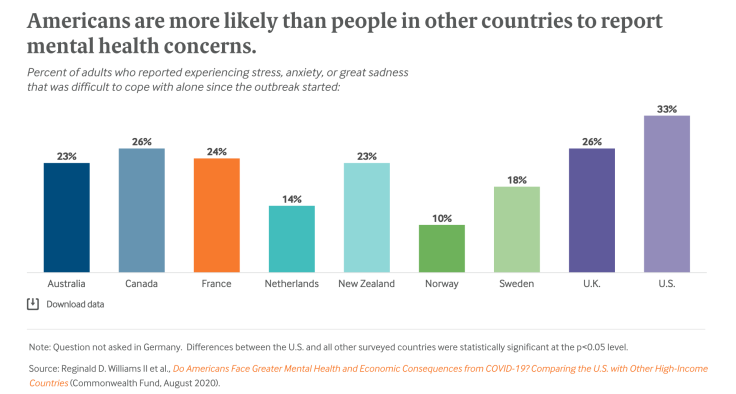
A new report from the Commonwealth Fund shows people in the United States are experiencing greater mental health and economic challenges from COVID-19, and they are less happy with their national leaders.
The survey Do Americans Face Greater Mental Health and Economic Consequences from COVID-19? compared residents of nine other high-income countries for a total of 8,259 adults that were interviewed between March and May 2020. The analysis provides country-specific data on people’s experiences during the early months of COVID-19 (March-May) in the U.S., Australia, Canada, France, Germany, Netherlands, New Zealand, Norway, Sweden, and the United Kingdom.
“As our country struggles with the surging number of cases and the economic havoc that the pandemic is wreaking, people in other countries are living a different, better, reality. Americans should realize that our country can do better, too. We can start by ensuring everyone can get and afford the health care they need, and by implementing public health measures, like mask-wearing, social distancing, and robust testing and tracing that can help us stop COVID-19 as so many others have effectively accomplished,” said David Blumenthal, M.D., Commonwealth Fund President.
Among the findings:
- Americans are more likely to report mental health concerns since the start of the pandemic. One-third (33%) of U.S. adults reported stress, anxiety, and great sadness that was difficult to cope with by themselves, compared to about a quarter or less in other countries.
- Americans are the most likely to report negative economic consequences because of the COVID-19 pandemic. More than 30 percent of U.S. respondents said they have struggled economically and were unable to pay for basic necessities, used up all their savings, or borrowed money, a significantly greater percentage than in any other country. Rates were also high in Canada (24%) and Australia (21%) but were low in Germany and the Netherlands, where only 6 percent to 7 percent of respondents reported the same.
- Americans are the least likely to have a positive opinion of the national government’s pandemic response. Only 33 percent of U.S. adults said President Trump has done a “good” or “very good” job of handling the coronavirus pandemic. In other countries, between 49 percent and 95 percent of respondents approved of how their president or prime minister has dealt with the crisis. People in all the countries surveyed appreciated health care workers’ responses to the pandemic, with 78 percent to 96 percent saying that hospitals, nurses, and doctors had done a good or very good job.

“What we learn from this study is that in the U.S., the pandemic has taken a greater toll on people’s well-being when compared to other high-income countries. As the number of confirmed COVID-19 cases and deaths in the U.S. continues to increase, policymakers — at all levels of government — should look abroad for innovative solutions," said Reginald D. Williams II, lead author of the study and Commonwealth Fund Vice President for International Health Policy and Practice Innovations. "There are valuable lessons we can learn, particularly around improving access to mental health services, and addressing socioeconomic needs exacerbated by the pandemic.”
© 2025 Latin Times. All rights reserved. Do not reproduce without permission.






